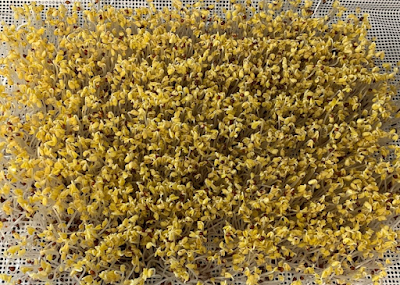Batch BO-240314
Quantity of Seeds: 2 soup spoons of brassica oleracea var. italica (broccoli)

Mar 14, 2024, 11:55 PM - Soaked the seeds in warm water and sat the bowl on a heating pad for a target time of 12 hours.

Mar 15, 2024, 10:40 AM - Removed the seeds from the water and placed them onto a growth tray. Placed two spacers onto the growth tray and covered the seeds with another tray to create a moisture barrier and a blackout condition.
Mar 15, 2024, 8:00 PM - Sprayed water onto the seeds to maintain moisture and inspected germination progress. Covered the tray to maintain blackout.

Mar 16, 2024, 6:00 PM - Sprayed water onto the seeds to maintain moisture and inspected germination progress. Observed signs of early germination from some seeds. Seeds that were brunched up too much were spread out more to increase separation. Covered the tray to maintain blackout.

Mar 17, 2024, 1:00 PM - Sprayed water onto the seeds to maintain moisture and inspected germination progress. Signs of germination can be spotted. Sprouts are slowly growing out from the seed and the roots are slowly growing below the silicon sheet. Bottom watering will start once the root is long enough to reach the water. No weight or pressure is applied to the seeds at this time to prevent standing water from condensation from touching the seeds.

Mar 18, 2024, 10:40 AM - Seeds are continuing to grow healthily. Sprayed water onto the seeds to maintain moisture and covered the tray to maintain blackout.


Mar 19, 2024, to Mar 22, 2024 - Once the roots are long enough for bottom watering to take place, the water tray is filled with water at or slightly below the growth tray level to keep the roots well watered. The top of the spouts are no longer sprayed with water to prevent mould and bacteria growth. Seeds are covered up with another tray with weight to maintain blackout conditions and to stress the spouts to grow taller during the process.


Mar 23, 2024, to Mar 24, 2024 - Removed the spouts from blackout and weight and exposed them to growth light for 8 hours per day (from 11 PM to 7 AM) and ambient room light at all other times.


Mar 25, 2024, to Mar 31, 2024 - The microgreen is becoming more green as the day passes. The growth tray is watered regularly to provide sufficient water for the microgreen's root. Exposed the microgreen to growth light for 8 hours per day (from 11 PM to 7 AM) and ambient room light at all other times. The 11 PM to 7 AM time was chosen so as not to interfere too much with daily activities around the home.

Apr 1, 2024 - Harvest Day! The microgreen is harvested after growing for 15 days.

Comments
Post a Comment